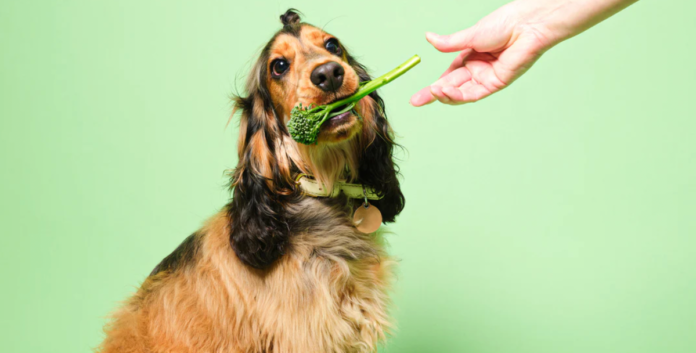Nearly half (46%) of UK dog owners admit to feeding their pets human junk food
Pooch & Mutt has unveiled the results of its latest survey uncovering the feeding habits of UK dog owners.
The survey, which gathered responses from 1,500 dog owners across the UK, has revealed some surprising trends and highlighted the need for greater awareness about dog nutrition amongst dog owners.
For instance, one in eight dog owners have had to take their dogs to the vet due to illnesses caused by consuming human food.
Key findings include:
- Common Human Foods Given to Dogs
Nearly half (46%) of dog owners admit to feeding their pets human junk food.
Whilst some human foods can be safe and nutritious, junk food poses significant health risks to our dogs. However, nearly half of dog owners feed their pets junk food, including sweet treats, savoury snacks and takeaway food.
According to Pooch & Mutt’s Resident Vet Dr. Linda Simon, ‘While it can be tempting to offer junk food (like cakes, biscuits and crisps) to your dog, you are doing more harm than good. These foods can lead to fussiness, refusal of their dog food, obesity and even episodes of pancreatitis. Pancreatitis is a serious health condition – an inflammation of the pancreas which can be fatal and is often triggered by giving fatty or greasy foods.
Feeding foods too high in carbohydrates and sugars could even lead to poor behaviour, hyperactivity and trouble paying attention during training sessions.’
Over half of dog owners (52%) feed their pets meat (like chicken, beef and pork), which is one food that we can certainly share with our pups. Boiled, plain chicken is recommended for dogs who are experiencing digestive issues as it’s easy on their stomach, however, beware of allergies – chicken is actually the most common allergen in dogs!
Additionally, you should always make sure that any cooked meat you give your dog is boneless and seasonless. Common encroûtements we tend to eat with meat, like onions and garlic, are very toxic to dogs.
57% of dog owners feed their pets fruits and vegetables, which can be a healthy and tasty snack often found in their dog food, however, it’s important to be aware of which fruits and vegetables are off limits due to being harmful such as onions, garlic, grapes and avocado.
Over a quarter (27%) give their dogs dairy products such as cheese, yoghurt, milk and ice cream. Cheese can be a high-reward treat for some pups, however, it’s very high in fat and salt so should be used very sparingly. On the other hand, it’s common for dogs to be lactose intolerant, so too much dairy can cause an upset stomach.
- Frequency of Feeding Human Food
We’ve seen that the majority of dog parents have admitted to feeding their pups human food, but how often are they doing so? Frequent feeding of non-dog-specific food can lead to nutritional imbalances and health issues.
One-third of dog owners (30%) feed their dogs human food up to three times a week, with 13% doing so daily.
Dr. Linda Simon shares, ‘Over time, feeding too much human food can lead to nutritional deficiencies. Remember, dog food is complete and balanced, meaning it contains all of the essential macro and micronutrients, such as calcium, iodine and magnesium.
More often than not, when we give human food rather than dog food, the diet will be lacking in something. For those very keen on giving home-cooked food, the diet should be created alongside a vet nutritionist.’
We want our dogs to be around for as long as possible, and the first step is a diet that does nothing but fill them up with tasty, safe and nutritious ingredients.
- Health Impacts:
One in eight dog owners have had to take their dogs to the vet due to illnesses caused by consuming human food.
As well as finding that one in eight dog owners have had to take their pups to the vets after feeding them human food (13%), our results showed that over one in five noticed symptoms like an upset stomach causing loose stools, whimpering and vomiting (11%) as well as a decrease in their mood, becoming lethargic and sleeping more than normal (11%).
‘The foods that are most important to avoid include toxins (anything containing chocolate, xylitol, raisins, grapes, alcohol and macadamia nuts), very greasy foods (such as rashers, chips and pizza) and foods with no real nutritional value (like sweets)’ adds Dr. Linda Simon.
When consumed, these foods can cause complications like those our dog owners reported, as well as: constipation, lack of appetite, itching and scratching, twitching, gut blockages, hunched back from stomach pain, and in severe cases seizures or organ failure.
With so many potential complications that could lead to expensive medication, serious surgeries or even death, it begs the question – why are we still feeding our dog’s human food?
- Knowledge Gaps:
One in three dog parents (32%) feel they could do with further insight/help into what they should be feeding their dog and when.
Regarding understanding the impact of feeding their dog human food, over one in six (16%) dog owners said they could benefit from further knowledge on what to feed their dog to help them make more sensible decisions, while one in three (32%) dog parents feel they could do with further insight/help into what they should be feeding their dog and when in general.
Furthermore, our survey showed that over a third of dog owners (37%) said that although they’re knowledgeable about which brands provide the best food, they’re not overly knowledgeable when it comes to understanding the ingredients and what may be harmful.
Not all human food is toxic to dogs, but a lot of foods and common ingredients are which can lead to many serious health conditions and issues. That said, our survey results show that whilst the majority of dog parents do indulge their pups with a human food treat once in a while, many do so without confident knowledge of what ingredients are safe, and which are harmful.
However, what our survey did uncover is the willingness of loving and attentive dog parents to want to learn more about feeding their pups a nutritious diet. One that does nothing but give them the energy, joints, gut, coat and teeth they need to live a fun, happy, healthy and energetic life!
Help keep news FREE for our readers
Supporting your local community newspaper/online news outlet is crucial now more than ever. If you believe in independent journalism, then consider making a valuable contribution by making a one-time or monthly donation. We operate in rural areas where providing unbiased news can be challenging. Read More About Supporting The West Wales Chronicle























